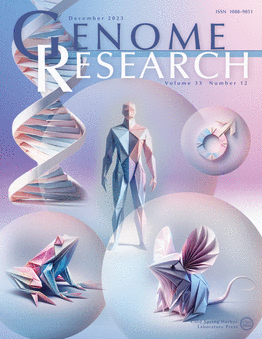人类代谢物水平的广泛自然选择
IF 6.2
2区 生物学
Q1 BIOCHEMISTRY & MOLECULAR BIOLOGY
引用次数: 0
摘要
自然选择对人类复杂性状的作用无处不在,主要是限制极端表型的出现(稳定选择)。这些制约因素会传播到与被选择性状相关的 DNA 序列变异中。因此,通过结合遗传关联研究的效应大小估计值和相应的等位基因频率,可以检测到此类进化事件的遗传印记。虽然这种方法已成功应用于高级性状,但人们对分子性状选择的普遍性和模式仍然知之甚少。在这里,我们估算了自然选择对与代谢物水平相关的遗传变异的作用,代谢物水平是分子性状的一个重要层面。通过利用已发表的大样本量全基因组关联研究的汇总统计,我们发现在 97 种血浆代谢物中,有 15 种存在稳定选择的有力证据。孟德尔随机化分析表明,处于较强稳定选择下的代谢物对一系列临床相关的复杂性状具有较大的影响,这表明保持无病特征可能是代谢组选择性限制的一个重要来源。在人类中处于强稳定选择下的代谢物在不同哺乳动物物种中的浓度也更加一致,这表明在微观和宏观进化时间尺度上存在共同的选择性力量。最后,我们还发现了对特定脂质代谢物进行破坏性选择和定向选择的证据,这可能表明人类正在进行进化适应。总之,这项研究表明,人类代谢物水平的变化经常受到自然选择的影响,这可能通过它们对疾病易感性的因果影响发挥作用。本文章由计算机程序翻译,如有差异,请以英文原文为准。
Widespread natural selection on metabolite levels in humans
Natural selection acts ubiquitously on complex human traits, predominantly constraining the occurrence of extreme phenotypes (stabilizing selection). These constraints propagate to DNA sequence variants associated with traits under selection. The genetic imprints of such evolutionary events can thus be detected via combining effect size estimates from genetic association studies and the corresponding allele frequencies. While this approach has been successfully applied to high-level traits, the prevalence and mode of selection acting on molecular traits remains poorly understood. Here, we estimate the action of natural selection on genetic variants associated with metabolite levels, an important layer of molecular traits. By leveraging summary statistics of published genome-wide association studies with large sample sizes, we find strong evidence of stabilizing selection for 15 out of 97 plasma metabolites. Mendelian randomization analysis revealed that metabolites under stronger stabilizing selection display larger effects on a range of clinically relevant complex traits, suggesting that maintaining a disease-free profile may be an important source of selective constraints on the metabolome. Metabolites under strong stabilizing selection in humans are also more conserved in their concentrations among diverse mammalian species, suggesting shared selective forces across micro and macroevolutionary time scales. Finally, we also found evidence for both disruptive and directional selection on specific lipid metabolites, potentially indicating ongoing evolutionary adaptation in humans. Overall, this study demonstrates that variation in metabolite levels among humans is frequently shaped by natural selection and this may act through their causal impact on disease susceptibility.
求助全文
通过发布文献求助,成功后即可免费获取论文全文。
去求助
来源期刊

Genome research
生物-生化与分子生物学
CiteScore
12.40
自引率
1.40%
发文量
140
审稿时长
6 months
期刊介绍:
Launched in 1995, Genome Research is an international, continuously published, peer-reviewed journal that focuses on research that provides novel insights into the genome biology of all organisms, including advances in genomic medicine.
Among the topics considered by the journal are genome structure and function, comparative genomics, molecular evolution, genome-scale quantitative and population genetics, proteomics, epigenomics, and systems biology. The journal also features exciting gene discoveries and reports of cutting-edge computational biology and high-throughput methodologies.
New data in these areas are published as research papers, or methods and resource reports that provide novel information on technologies or tools that will be of interest to a broad readership. Complete data sets are presented electronically on the journal''s web site where appropriate. The journal also provides Reviews, Perspectives, and Insight/Outlook articles, which present commentary on the latest advances published both here and elsewhere, placing such progress in its broader biological context.
 求助内容:
求助内容: 应助结果提醒方式:
应助结果提醒方式:


